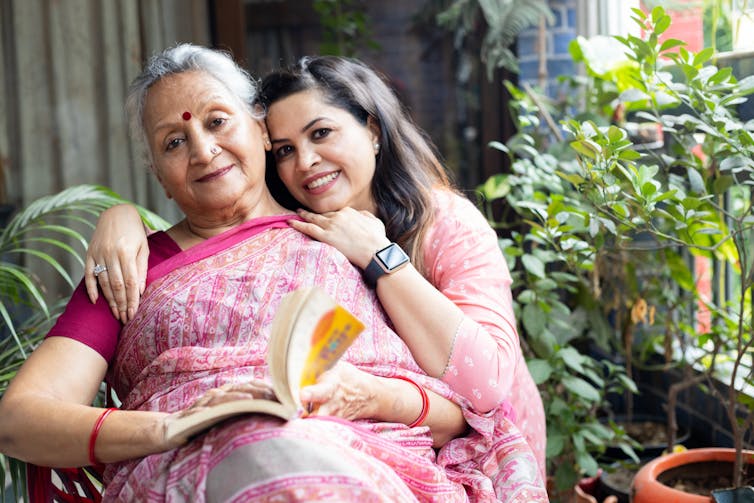
In 2020, an estimated 597,000 individuals were living with dementia in Canada. By 2030, that number is expected to increase to almost one million, and by 2050, almost 1.7 million.
Dementia is a global struggle affecting many around the world. In South Asian communities, an intricate tapestry of cultures, languages and traditions engenders a caregiving dynamic for those living with dementia.
Dementia care in South Asian households is nuanced and complex and is shaped by cultural, familial and societal forces.
Strong familial bonds and respect for elders provide a foundation for support. However, stigma, language barriers and gendered caregiving roles can create formidable challenges.
By understanding these diverse dynamics, experts and medical practitioners can provide better and more tailored support to South Asians with dementia and the people who care for them.
Table of Contents
Caregiving in South Asian communities
Strong family bonds: The South Asian community is characterized by its close-knit family structures, where family members often share caregiving responsibilities. This communal caregiving approach fosters unity and support, allowing individuals with dementia to remain within their familial environment.
Respect for elders: South Asian cultures traditionally hold elders in high regard. This fosters a sense of duty and responsibility toward caring for aging family members and can translate into a heightened commitment to caregiving for individuals with dementia.
These values are also informed by religious beliefs and cultural practices. In Hinduism, the concept of Pitru Rin (debt to ancestors) emphasizes the obligation of children to repay their parents for their nurturing and care. Similarly, Islam strongly emphasizes respecting and caring for one’s parents and elderly relatives, as prescribed in the Qur’an and Hadith. In Sikhism, the concept of seva (selfless service) extends to caring for elders in the community. Cultural norms and expectations shape the roles and responsibilities of care partners.
Multi-generational households: Many South Asian households often have multiple generations living under one roof. This arrangement can benefit dementia caregiving, allowing continuous care, emotional support and companionship.

(Shutterstock)
Challenges to caregiving
Stigma and a lack of awareness: Stigma surrounding dementia is prevalent and can often mean people delay getting medical help and lack awareness about available support. This can lead to isolation and a lack of care for people with dementia.
Collectivism: South Asian cultures emphasize collectivism, where the needs of the family or community take precedence over individual needs. This can influence the decision-making process regarding caregiving arrangements.
While collectivism can provide a robust support network, it can also lead to care partners neglecting their well-being in favour of the needs of the person living with dementia.
Language and cultural barriers: Language and cultural differences can pose significant challenges in accessing appropriate care and information about dementia. People with dementia and their caregivers may not be fluent in the language of their host country. That can make it especially challenging to communicate effectively with doctors and navigate health-care systems.
Read more:
Navigating dementia care in the South Asian community: Overcoming barriers and stigma
Emotional and financial stress: Caregiving for a loved one with dementia can be emotional and stressful for anyone. The constant demands of caregiving, coupled with the progressive nature of dementia, can lead to caregiver burnout and mental health issues.
In South Asian communities, caregiving responsibilities often fall on daughters or other female relatives due to gendered expectations of their role in the family. Women often have to juggle caregiving with their other household and family duties.

(Shutterstock)
Living in multi-generational households can also bring additional stress for family members tasked with caregiving. Long-term care homes are often viewed negatively due to cultural values that prioritize family unity and the belief that it’s the responsibility of younger generations to care for their elders at home. That can be compounded by financial stress if caregivers have to quit jobs to provide care full-time.
Supporting caregivers
Acknowledging and supporting caregivers is crucial for a more equitable future. This support entails recognizing and valuing their unpaid care work.
Employers should promote flexibility and provide workplace resources to ease caregiving burdens. These could include offering flexible work arrangements, adjusted hours and remote working options. They can provide paid family leave to accommodate caregiving needs and consider providing childcare support.
Financial support and legal protections further empower caregivers. These concerted efforts from governments, employers and communities collectively contribute to a more equitable and inclusive society.
By acknowledging the positive aspects of caregiving and addressing the negatives, society can work toward enhancing the well-being of South Asian care partners and individuals with dementia.
It is imperative to address the unique challenges faced by South Asian care partners and individuals with dementia. This includes promoting awareness about dementia, overcoming language barriers in health care and fostering culturally sensitive support networks.
![]()
Navjot Gill does not work for, consult, own shares in or receive funding from any company or organisation that would benefit from this article, and has disclosed no relevant affiliations beyond their academic appointment.
























